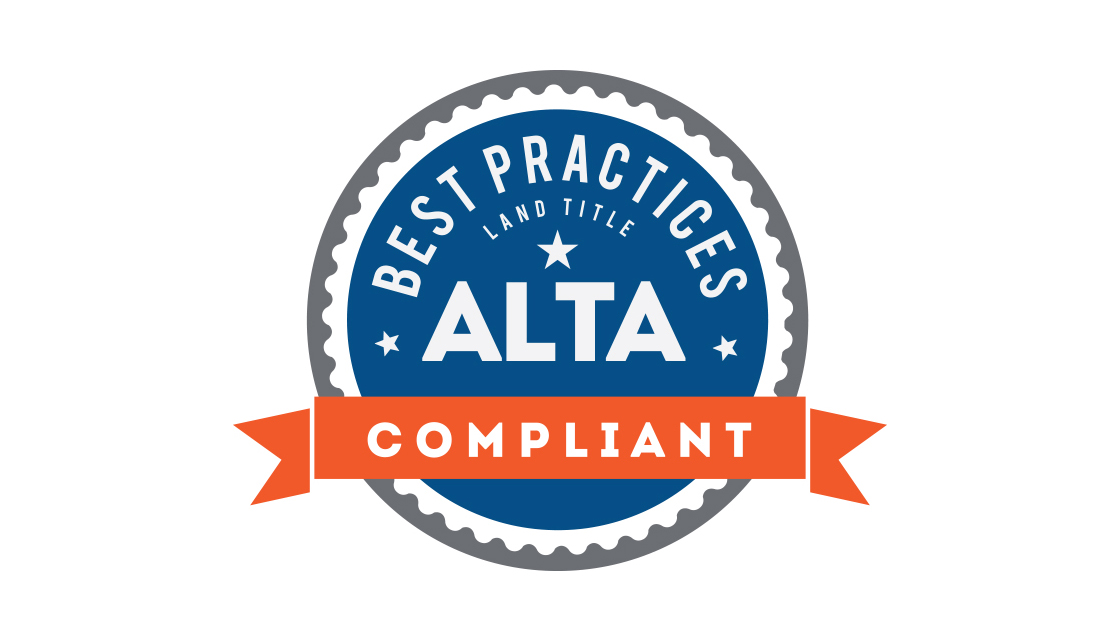
ALTA Best Practices
ALTA Best Practices
Numerous measures are being implemented to protect consumers from making misinformed financial decisions. As a result, lenders are seeing increased pressures from regulators and investors to review their practices and understand more about the service providers that they work with on a day-to-day basis. In response to this current pressure, the American Land Title Association (ALTA) decided to develop best practices to demonstrate the policies and procedures the title insurance industry exercises to protect lenders and consumers in their real estate transactions.
The practices were developed by ALTA’s Board of Governors which includes representatives of both the agent and underwriter communities. Although not mandatory, the guidelines are designed to enhance the tools used to ensure that lender and consumer transactions are protected and safe, and that products and services are delivered properly. These practices will be updated on an ongoing basis and will be adapted based on feedback from the lender community and title insurance industry.
Seven Best Practices
- Establish and maintain current license(s) as required to conduct the business of title insurance and settlement services. This practice ensures that a title company remains in good standing with the state they produce work in by maintaining all state mandated insurance licenses and corporate registrations.
- Adopt and maintain a written procedures and controls for Escrow Trust Accounts allowing for electronic verification of reconciliation. This practice provides procedures to ensure accuracy of escrow trust accounts and minimize the exposure to loss of client funds. Procedures include reconciliation of escrow trust accounts, proper identification of escrow trust accounts, transactions only conducted by authorized employees, and regularly conducted background checks on new and existing employees.
- Adopt and maintain a written privacy and information security program to protect non-public Personal Information as required by local, state and federal law. Federal and state laws require title companies to develop a written information security program that describes their procedures to protect non-public customer information. Procedures to meet this best practice include:
- physical security of non-public personal information
- network security of non-public personal information
- disposal of non-public personal information
- establishing a disaster management plan
- training and management of employees of company’s information security program
- selecting and retaining service providers capable of appropriately safeguarding non-public personal information
- audit and oversight procedures to ensure compliance
- notification of any security breaches to consumers and law enforcement
- Adopt standard real estate settlement procedures and policies that ensure compliance with Federal and State Consumer Financial Laws as applicable. The company adopts policies involving recording and pricing procedures that all employees follow and continue to be trained upon to provide a safe and compliant settlement. Some procedures to put in place to comply with the practice include using rate manuals or online rate calculators to ensure appropriate fees are being charged and doing quality checks after settlement to verify that consumers were charged the company’s established rates. Companies should also review their legal and contractual requirements when handling the recording of documents and incorporate those requirements into their procedures.
- Adopt and maintain written procedures related to title policy production, delivery, reporting and premium remittance. This practice ensures that title insurance policies are issued and delivered to customers in a timely manner. Also, title insurance policies are reported and premiums are remitted to the underwriter in a timely manner to ensure the applicable coverages are in place.
- Maintain appropriate professional liability insurance and fidelity coverage. This practice ensures that title agencies and underwriters have the financial capacity to stand behind their professional services. Based on the company’s size and scope of its operations, the company should carry professional liability insurance that is acceptable to their underwriter(s) and lenders. State law may also require for a company to maintain fidelity bond and surety bond policies with prescribed minimum amounts of coverage.
- Adopt and maintain procedures for resolving consumer complaints. Develop standard procedures to receive, address, document and resolve consumer complaints. This is to ensure that any instances of poor service do not go unnoticed.
ALTA will continue to develop tools and resources for its members to make it easier to certify these practices. ALTA has shared these practices with the Consumer Financial Protection Bureau, regulators and lenders. Best Practices provides the standard for all consumers and lenders to continue to have confidence in the title industry for their future transactions.